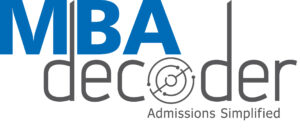
B-schools take a holistic approach to evaluating applicants for MBA admissions. Your academic grades, career progression, leadership skills, and personal and professional achievements are all critical aspects that make you competitive. That said, the most significant criterion remains your academic preparedness for handling an MBA program’s rigorous curriculum. To measure this, b-schools closely look at your English language proficiency and quantitative strength.
English proficiency
English is the common language of communication among classmates, professors and industry professionals, so you must know it sufficiently well to exchange ideas and contribute to each other’s learning.
How can you demonstrate English proficiency?
If you are an international applicant, B-schools will expect you to demonstrate your comfort with English. Completing your undergraduate degree where the language of instruction was solely English usually suffices. Moreover, a high score on the verbal section of GMAT/ GRE suggests your ability to read and comprehend written material, and reason and evaluate arguments effectively. You can also take the TOEFL, IELTS, PTE or Duolingo English Test (most B-schools offer a waiver if your undergraduate education was in English).
Other ways to establish your communication skills are through your essays, video essays, and interviews. If you are involved in public speaking organizations such as Toastmasters International, highlight it in your resume and/or the data form. Moreover, your recommender could speak to your communication and presentation skills and ability to converse effectively in a global business setting.
Quantitative Proficiency
It is equally important to have some level of quantitative capability as the MBA curriculum, with courses in finance, accounting, strategy, economics, marketing and operations, requires analytical work and use of quantitative concepts and data. These courses are part of the core curriculum and you may also take advanced modules as electives or specializations. Therefore, having quantitative capability becomes essential for sailing through these courses.
How do B-schools measure quantitative proficiency
B-schools use a combination of data points- the undergrad GPA, non-degree coursework or professional certifications, standardized test scores, and professional experience to evaluate your quantitative skills.
If you have studied STEM courses, engineering, business or economics during undergrad, it’s easier to prove your numerical dexterity. However, if you have a social sciences, humanities or liberal arts background, it can be challenging to prove your strength with numbers. Also, some applicants working in technical fields use their numerical skills regularly at work, whereas others, such as lawyers, teachers, veterans or fashion designers may not use them as much.
Does this mean that applicants who don’t have quant experience should not apply for an MBA?
Hardly so.
B-schools invite students from various academic and professional backgrounds to build diverse cohorts. This is because much of the educational learning is through class discussions where students bring insights guided by their individual backgrounds and experiences. An analytically wired software engineer is likely to benefit from the perspective of a creative-minded media specialist and vice versa. That said, applicants who have not taken many quant-heavy courses in college will be better prepared to handle the academic rigor at b-school if they build their quantitative profile; this will also strengthen their candidacy in the admission process.
How can you demonstrate quantitative proficiency?
The most important thing is to get a high GMAT or GRE score. B-schools don’t prescribe a minimum value for the standardized test scores, but they publish the class average scores for both GRE and GMAT. They also give the 20% to 80% range of the class scores, along with sectional breakups for the quantitative and verbal components of the tests. Use these figures to compare your test scores and gauge where you stand. Also, look at both the overall GMAT and individual quant and verbal scores to get an accurate idea. If you belong to an overrepresented pool of applicants (such as Indians, consultants, software engineers) you should try scoring towards the higher 80% of the class score to gain a competitive advantage.
B-schools thoroughly examine your undergrad transcripts to determine what kind of courses you studied and their academic rigor. If you have no prior exposure to quantitative coursework, then take a few college-level courses in math, statistics, calculus, microeconomics, financial accounting, statistics, finance or Excel. Online learning options are available, but enrolling in graded courses is more credible.
B-schools also consider professional certifications such as Chartered Accountancy (CA), CFA, ACCA, PMP and Six Sigma. These certifications are academically challenging and completing them ascertains your ability to handle quantitative concepts. However, we do not recommend undertaking these courses solely for the sake of admission. During profile discussion conversations, applicants often ask us if they should do one of these certifications even though these may not be relevant to their career (imagine a software developer considering a CA just to enhance their MBA profile). Our answer is always a “no”. These courses are demanding, and they should contribute directly to your job or your desired career path. However, if you have or are pursuing these certifications, don’t forget to mention them in the resume or the application form.
Non-degree courses like MBA Math, HBS CORe, and MITx MicroMaster are well regarded among b-schools. The MBA Math course provides basic training in Excel, accounting, finance, statistics, and economics, and can be completed in 7 to 10 days. The cost of this program is $149. The HBS CORe is a more intense course which takes 10-17 weeks and covers business analytics, economics for managers, and financial accounting. This course costs $2,500. The MITx MicroMaster, recommended by MIT to its applicants, offers a choice of pathways in Supply Chain Management, Data, Economics and Design policy, Principles of Manufacturing, Statistics and Data Science and Finance. Each program requires completing 4-6 core courses and electives, followed by an exam.
To summarize, there are different ways to demonstrate your communication skills and quantitative proficiency to show your academic preparedness for b-school admission. If some aspects of your academic background may not be immediately understood and need explanation, there’s always the optional essay. If your GPA or test scores are not in the desired range, use the essay to explain how you have strengthened your skills through alternate methods. Although you don’t necessarily have to attempt the optional essay, but if there are any ambiguous or extenuating circumstances that put a question mark on your academic preparedness, then its better to be cautious and explain them through this essay.
